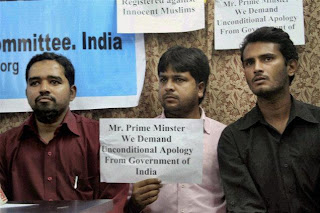“Unfortunately, sometimes life imitates fiction,” Mr. Ravi Chander noted in his report, going on to detail the shocking lack of procedure in the detention of Mr. Rayeezuddin and others: “[The boys] reiterate with telling consistency the now familiar story of arrest without warrant, arrest without informing the kith and kin, being taken away to unknown places, torture, etc … Typically a pigment on skin reflecting minor electric shocks are visible. While time heals the physical wounds, [they have] left an indelible impression on the psyche of the persons.” It was like a macabre replay as each boy spoke — of being detained without knowing the charge, of extended periods of torture, of indifferent magistrates who somehow always missed the distress signals from the prisoners, of being forced to confess to terror plots and of having to sign on blank papers.
Mr. Ravi Chander's report reiterated the procedure laid down by the Supreme Court for arrest and detention, including maintaining records of the time and date of arrests along with the names of officers executing the warrants; preparing a memo of arrest, signed by a witness preferably from the detainee's family and countersigned by the detainee; ensuring a tri-weekly medical examination of every detainee and keeping a memo of major and minor injuries, again countersigned by the detainee. The Supreme Court held failure to comply with the requirements to be punishable with departmental action and contempt of court proceedings.
Mr. Ravi Chander concluded his report with this chilling passage: “To counter terrorism and “counter terrorism” [by the State] are not one and the same … It is clear that all the victims belong to a single community and mostly to a single economic class. This may be insufficient to place the burden surely at a single door-step, namely the police. This however surely tells a pattern. A seriously dangerous pattern.”
Mr. Ravi Chander's findings came as a surprise to civil rights activists. Because, as he himself laughingly told The Hindu, “I am not viewed as a Muslim-friendly person, as I had fought on the opposite side on the issue of Minorities reservation.” But this fact has only enhanced the credibility of the report.
Vidya Subramaniyam in The Hindu. More Here.

4 comments:
Do you expect an apology from the Congress Government? Ha Ha Ha... You must be living in fool's paradise.
Given the heart wrenching atrocities inflicted upon innocent youth, it is natural that a demand has been made for an apology from the Government. It is the minimum demand. You cannot compensate those young souls with anything. Even if you give them crores of rupees it is meaningless for them. They cannot regain their youth and years lost in prison.
Amidst this gloomy scenario, a demand for unconditional apology makes sense. It may not give back the years spent in jails. But it may give a solace to the battered youth.
There is nothing to laugh here. It is the most serious and tragic issue. We have to think in the perspective of the victims. They have lost everything just because they happened to be Muslims. Being a Muslim has become the most dangerous proposition. Oh Tempra..! Oh Moras
I agree with Muhammad Zafar. There is nothing to laugh here. It is a question of Justice. Hope the battered souls get Justice.
Post a Comment